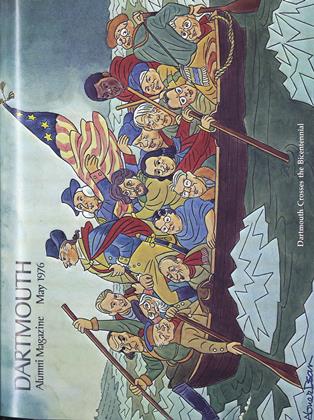In over 40 years at Dartmouth the late Herbert Faulkner West '22, probably taught over 10,000 undergraduates. Thus his real legacy, like that of any teacher, lies in the intellects, memories, and hearts of those 10,000, now alumni, who listened to his lectures on Conrad or Cunninghame Grahame, Mencken or Frost, Thoreau or Tomlinson.
On March 13, however, the College undertook a more formal recognition of his contributions to Dartmouth with the dedication of the Herbert F. West Room in Carpenter Hall. A reception held to mark the occasion was attended by Mrs. West and over 50 of his friends. Unveiling a memorial plaque, vice president Leonard M. Rieser '44, recalled Herb West's long career as Hanover's literary man for all seasons: teacher, first and always; but also benefactor of the library, author of numerous books, founder of the Friends of Library, bibliophile and, in retirement, rare book dealer.
The donor through whose generosity the Herbert F. West Room became possible has elected to remain anonymous. But if it was he who chose the inscription on the memorial plaque, then he obviously knew his man. Herb West was a teacher, the plaque reads, "who made you listen, made you learn and, most of all, made you use your brain to absorb what you were reading." And at the bottom the name, then the vital statistics: "Teacher of Comparative Literature, 1922-1964." Not Professor though he was that but Teacher. Herb West would have abundantly approved the implied distinction.
A portfolio of photographs by Dewitt Jones '65, filmmaker and producer whose NewEngland of Robert Frost had its premiere at the Hopkins Center last December, is joined to a text by Archibald MacLeish in the April issue of the National Geographic to produce a penetrating study of Robert Frost '96. Entitled "Look of a Land Beloved," MacLeish's text and Jones's 15 full-page photographs make much the same point about Frost's relationship to New England, the one in clearly argued prose, the other in images: far from being the uncomplex regional poet celebrating the country- side north of Boston, Frost characteristically approached New England's people, landscape, and natural events with an ironic, even somber, eye. Obviously, Frost recognized the beauty of rural New England, but he also recorded the forbidding, implacable quality of the land as well. And to keep the two apart, he well knew, "one had to be versed in country things."
Each of Jones's photographs is accompanied by a short passage from a Frost poem which the image presumably illustrates or, more properly, embodies. Dartmouth readers, resident and non-resident, will find familiar sights among the photographs; they were taken in Orford, Lyme, Thetford, Norwich. But in the images, as in the Frost poems they embody, one may also sense the photographer's essential grasp of the clearheaded unsentimentality and the multi-level complexity of the poet's view of New England. "The woods are lovely, dark, and deep,/ But.... Jones's New England is scenic, to be sure; it could scarcely be otherwise. But it is not bucolic. It is not picture-postcard New England. And neither, assuredly, was Robert Frost's.
L. K. Little '14 is the author of an extended introduction to the two-volume set of correspondence entitled The I. G. in Peking.Letters of Robert Hart, Chinese MaritimeCustoms, 1858-1907 as newly published by the Belknap Press of Harvard University Press.
With this issue John Hurd '21, professor of English emeritus and member of the ALUMNI MAGAZINE staff since 1946, retires as editor of the reviews department. He departs in good health and, after coping with several hundred books by Dartmouth authors, his affection for literature intact. He is succeeded by Robert H. Ross '38, a retired professor of English and author (critical studies of Tennyson and 20th century poetry), who now lives in Norwich.
 View Full Issue
View Full Issue
More From This Issue
-
 Feature
FeatureSelf-Evident Truths
May 1976 By ARTHUR M. WILSON -
 Feature
FeatureReading and Writing History and Revolutionary Footnote
May 1976 By PAGE SMITH -
 Feature
FeatureWhen Dartmouth Had Its Own State (Almost)
May 1976 By JAMES L. FARLEY -
 Feature
FeatureThanks to Daniel Oliver, A Gathering of Lovers
May 1976 By DAN NELSON '75 -
 Article
ArticleThe Green: A House Mover and an ex-President Proved Who Owns It (Didn't They?)
May 1976 By Jabberwocky, Lewis Carroll, JAMES L. FARLEY '42 -
 Class Notes
Class Notes1923
May 1976 By WALTER C. DODGE, CHARLES J. ZIMMERMAN
R.H.R.
-
 Books
BooksNotes on a common bond: the federal city, that summer in Philadelphia, Essex County in revolt, and disaster in Ohio
September 1976 By R.H.R. -
 Books
BooksAn Attendant Lord
November 1976 By R.H.R. -
 Books
BooksMonticello to Montmartre
November 1976 By R.H.R. -
 Books
BooksCity Views
April 1977 By R.H.R. -
 Books
BooksOut of the Night
November 1978 By R.H.R. -
 Books
BooksLooking Out for #1
September 1980 By R.H.R.
Article
-
 Article
ArticleMUSICAL
February, 1910 -
 Article
ArticleTHE WEBSTER CLOCK
April, 1912 -
 Article
ArticleMILITARY WORK AT DARTMOUTH
June 1917 -
 Article
ArticleMiscellany
NOVEMBER 1962 -
 Article
ArticlePEN AND CAMERA SKETCHES OF HANOVER AND THE COLLEGE BEFORE THE CENTENNIAL
May 1921 By EDWIN J. BARTLETT '72 -
 Article
ArticleWe Can Do Better
January 1943 By RICHARD A. HOLTON '18

